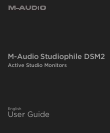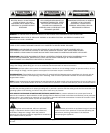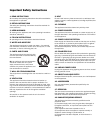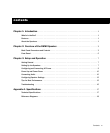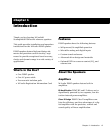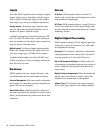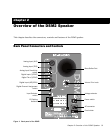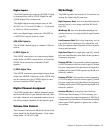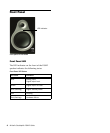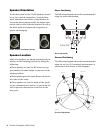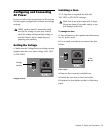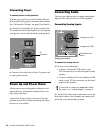M-Audio Studiophile DSM2 Guide2
Inputs
M-Audio DSM2 speakers allow analog or digital
inputs. Input type is selectable with the Input
Select switch on the back panel of the speaker.
Each input type has two available connectors.
Analog Inputs The analog input signal is sam-
pled on input and processed digitally until it
reaches the power amplifier stage.
Available analog inputs include balanced XLR
and 1/4-inch TRS connectors. These analog in-
puts are summed so that both input connectors
may be used at the same time.
Digital Inputs The digital inputs automatically
detect the sample rate and bit depth of the in-
put, and accept up to 192kHz/24-bit signals.
Available digital inputs include AES/EBU and
S/PDIF connectors. Only one digital connector
may be used at a time.
Enclosure
DSM2 speakers feature a high-efficiency, rein-
forced medium-density fiberboard enclosure.
Custom Waveguides The front panel waveguides
are designed to maintain accurate frequency re-
sponse and stereo imaging.
Bass Reflex Port A dual-flange bass reflex port
provides enhanced low frequency response and
clarity, while minimizing extraneous noise and
vibration.
Drivers
LF Driver DSM2 speakers have an 8-inch LF
driver with a steel frame and single-piece anod-
ized aluminum diaphragm.
HF Driver DSM2 speakers have a 1-inch HF driver
with a soft-dome ferro-fluid cooled design that
ensures smooth, accurate reproduction of high-
frequency details.
Digital Signal Processing
DSM2 speakers employ 36-bit digital signal pro-
cessing for control of crossover, EQ, and chan-
nel assignment settings.
Crossover The crossover function is handled by
a digital processor that ensures flat, distortion-
free integration of the LF and HF drivers.
EQ and Placement Settings Six filters allow for
customization of speaker response to a variety of
sonic conditions and speaker orientations in
your studio.
Digital Channel Assignment When working with
digital input, this switch is used to select the
channel to be monitored in the speaker.
Volume Trim The Volume Trim control adjusts
level of the input signal in the digital domain.



